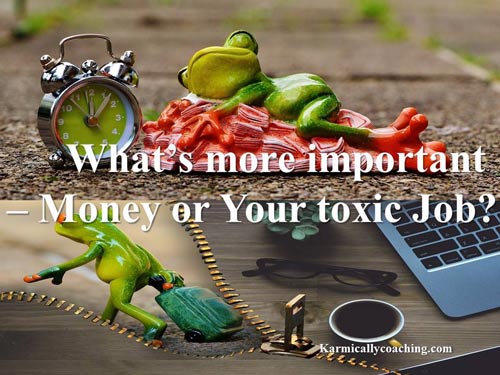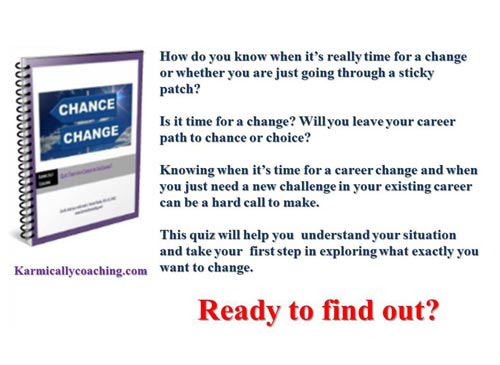This post has already been read 3606 times!

That’s a question any career professional stuck in a dead-end job must answer when they feel resistance building up for taking the right self-preservation step.
I use the word self-preservation because I’ve seen too many people stick it out. They felt there was no other option.
Later down the road, they’ve experienced burnout, health issues and in some cases dismissal for under-performance or worse, becoming a victim to vicious, toxic office politics.
I still recall one of the Partners in a Big Four firm where I worked tell the Team Managers at a monthly meeting where the agenda was under-performing staff, that 80% of the employees stuck it out because they were the best paymasters in town (which was true at the time).
They needed performance improvement plans and counselling if that didn’t work. And if necessary assisting in their graceful exit to a different job.
The same holds true when a professional doesn’t want to quit despite the toxic work environment. Were coming into work each day and giving their best has become a stressful challenge.
When it comes to toxic work environments, I will always tell you to quit the job and find another one. Or make it a time for self-reflection thinking about what you really want and what you don’t want.
Then, after figuring out the non-negotiable items, move on to new pastures.
Money of course is a more sensitive topic.
I prefer to approach every problem in a systematic manner. Checking and double checking if I have accounted for all the variables that impact my unique customized issue.
Step 1 Is it a job or career change that you need?
Sometimes, money isn’t really the issue.
It could be lack of interest in a present employment or a roadblock to career progression. Maybe your own personal and professional development has created a situation where what worked before doesn’t make you happy.
So put the money and toxic issue aside for a moment. Ask yourself, are you happy in your present employment? Are you getting the recognition that you deserve? Is your workplace creating stress for you?
I suggest you try this Career Quiz and find out the underlying reason first and then proceed to tackle it with the tips that accompany the quiz.
Now that we have that sorted out, the next step is to address the money issue.
Step 2 You feel you can’t afford the job or career change
Many times, we stick to a job without considering outside opportunities or even a career change because we’ve become accustomed to a certain lifestyle or standard of living. We don’t wish to compromise it or feel we can’t afford it.
If you’ve assessed that it’s a simple job change, then frankly, all you need to do is be on the lookout for other opportunities that offer you a similar pay packet.
Let the Executive Search professional whom you approach know the specifics of your desired compensation package.
Also remember to factor in further growth opportunities. Sometimes the lower compensation package may come with other non-monetary fringe benefits. For example, holiday entitlement or family medical insurance that your previous employer isn’t providing.
A career change is a different kettle of fish. You need to demonstrate transferable skills to the prospective employer in the new industry vertical and negotiate your move by positioning yourself properly.
You CAN afford a career or job change but it requires some practical steps.
This includes an audit of your financial situation, knowing when to make the move and practicing stress resilience building techniques until you’ve made the move.
When it comes to money, we often don’t know our real financial situation. If you aren’t already tracking your income and expenses, then I suggest you commit to keeping an accurate record of all your income inflows and outflows for the next 30 days to see where money comes in and goes out.
Money inflow includes your take home pay as well as income earned from passive sources like subsidies, bank interest, dividend, royalties, rent income (if you have rented out a property).
Money outflow includes all your expenses – even the ones on the credit card and direct debits for subscriptions, mortgage and loan payments. It also includes small expenses like bargain offers, coffee, newspapers, fast food and other small ticket items.
At the end of the 30 days you’ll have an idea of your net income savings or deficit.
Now review how much of that spend is absolutely essential. You’ll be surprised to see how many items can be cut out if you really need to.
Start by examining each category of expense and work out the bare minimum is that you could afford to live on.
You will probably find that, for a time at least, you could survive on much less than you think.
When you look at your income inflows, you might realize there are sources that you haven’t accounted for before. Or that your income does not need to come from one source.
If there are other earning members in the family, ask them to do a similar exercise with you during the 30 days to work out the exact family budget.
This exercise works best when it’s done over 2-3 months. At the same time, make a list of any annual one-off payment that you have to make like car insurance, home insurance and other liabilities to put aside a buffer to cover it.
Armed with this knowledge you are in a better position to hunt for a new job or career because the money issue loses its teeth and you can prepare a game plan to make up for any income deficit.
You can learn more about money and finance management in my round up blog post Cool solutions for pressing money issues
Step 3 What’s your attitude towards money?
If steps 1 and 2 haven’t resolved the money challenge for you, then step 3 is required to introspect and reflect on your attitude about money.
Our childhood experiences around money can affect our attitude towards it. If money was short, the child in you remembers the pain of not having enough. Perhaps forgetting that parents did the best they could and there were treats on special occasions.
Or your parents, teachers and elders told you that money didn’t grow on trees. You figured out that you had to save what you could but not the corpus that you needed.
Money becomes a commodity to be hoarded rather than a conduit to help you get what you want and need.
If this sounds familiar, then take some time out to reflect on the following questions:
If money weren’t an issue, what would you love to do?
How much is your self-image tied up with financial success?
How much money would make you feel secure?
Do you see money as a means or has it become a goal in itself?
Are there any money messages that you learned in your childhood from your parents and teachers that affects your attitude to money?
Would you like to let go of these habits and unleash the energy of money in your life?
Do you want to make friends with enemy rather than treat it like a bogey monster?
Want to make money your friend and use its power to your advantage rather than against you? I suggest reading and applying the guidance in Money Success Secret: The Alchemy of Mindset and Management.
I’ve shared strategies that will help you give money the kind of attention it craves to do positive work for you.
The book will help you consciously change the way you look at money and get more control over it. Plus bonus resources to help you get the most out of the teaching.
I’ve used these strategies myself at different times in my life and know that they are powerful. You can learn more here or by clicking the below image.
Returning to my original question, what’s more important for you – money or a toxic job?
How will you prevent money from becoming the key factor for staying in a dead-end job? Is ruining your health, relationships and work life balance worth it?







 I adhere to the Certified Coaches Alliance Code of Ethics and Standards. A copy is available on request.
I adhere to the Certified Coaches Alliance Code of Ethics and Standards. A copy is available on request.
 Let's Talk through the Connect Form:
Let's Talk through the Connect Form:
Great question, I feel very blessed that it is a long while since i even had to consider those options, faced with that now I know if i couldn’t create change where I was i would leave that situation. Thanks got me thinking xx
Thanks Suzie. Once we take the decision and let go of money fears in deciding our next step, the rest of the way becomes smoother.
Over the years I counselled many on just this issue. too asked clients to explore a change of job, environment or career. Most need someone like you to help sort it out. You write great posts on career matters.
Thanks Roslyn. Helping professionals find new directions and ways forward is one of the most rewarding jobs possible.
There are so many that face toxic situations in the workplace and I had to face this decision in the past. Mine was based on my being able to venture out on my own by understanding my worth – to myself and to others.
There is never a simple solution nor a single one that can be applied across the board. However, I do hope that your post helps others make the right decision for them, at the right time.
Right decision at the right time is essential. There are a number of factors that play a role in the timing, for example, if the job market is bad, then biding one’s time to exit and find a new job is an important criteria. Thanks for sharing your perspective and insight.
Excellent topic. I’ve been in the situation a couple of times where I needed to decide between money and my personal well-being. In both cases, I opted for well-being, but it’s never easy walking away from a corner office, fat paycheck, company car, and expense account. The one thing we rarely take into account when having to make a decision like this is how our friends and family will react to your change in “status” and it’s not always the way we’d like.
Thanks Marquita. It’s never easy to walk away but when the issue is well being, then we know what needs to be done. I agree with you about the reactions of our family and friends. Fortunately, when I left a toxic job that almost killed me, my family was very supportive and even offered to support me while I worked out my next move. Fortunately I didn’t have to use the offer but knowing there was a safety net gave me the courage to do the right thing by myself. Friends are another kettle of fish – mixed fish actually. As with any adversity, a change in status is a good acid test to weed out the real friends from those who aren’t. At the end of the day, it is our life and if we lose a few friends, then the Universe sends us better friends because the empty space needs to be filled.
Vatsala, I see we’re on a similar wavelength this week in our posts. I love that you champion empowerment and intention for your readers and clients. Some jobs, especially in big institutions and bureaucracies, seem to discourage independent and empowered thinking; thanks for continuing to take a stand for taking ownership of career choices. Blessed be.
I noticed that too Sue, and it made my heart sing with joy that I had a kindred spirit in empowering fellow professionals and new business owners. You are right, some enterprises whether in the public or private sector require total submission of Will of their employees. No wonder many leave because it suffocates their intellect. The one’s who stay behind need to be empowered to take the right step at the right time.
Although I’m not in a toxic job and have enough money to meet my current needs, this really spoke to me as I know I have a lot of abundance issues leftover from my childhood and your questions are brilliant and very clarifying. Thank you Vatsala.
Delighted the questions helped you rethink abundance issues from your childhood, Julia. We all have some minor roadblock that a little introspection can help clear up.
I’ve been in an extremely toxic workplace and due to a contract was unable to walk away; darn legalities. I was so thankful when I was able to walk away.
It’s awful when we get stuck in a contract and the consequences of reneging on the agreement have serious financial implications, Natasha. I’m sure you kept yourself going with visualizations of the day you could leave having executed all your contract commitments.
Vatsala, you ask the best questions! “Do you need a career or a job?” is just one of the many that popped out for me. I can see you bringing so much clarity, direction and purpose to so many through your work.
Thanks Reba. Interestingly the question that came to your mind is also one of the questions I ask to make the client reflect when resistance to clarity creeps in. 🙂 Thank you for the compliment, I appreciate you!